The first Battle of Bull Run, also known as the Battle of Manassas, is deemed the first important and crucial battle of the American Civil War. It was fought on July 21, 1861. It was during this specific battle that General Thomas Jonathan Jackson earned his legendary title “Stonewall” and made his legacy in American history, particularly in the Confederate military. The events of this battle alone showcase Jackson’s leadership skills and his strong character on the battlefield. He played the most vital role in the victory for his side and its success.
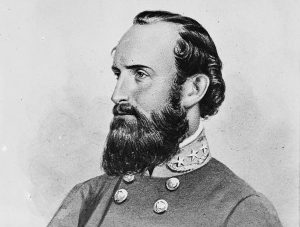
On the day before the battle, July 21, the Confederate forces were feeling immense pressure and worry. General Irvin McDowell’s troops, the Union forces, marched from Washington DC towards the Manassas junction. On the other side, the two generals, General P.G.T Beauregard and General Joseph E. Johnston, focused the greater part of their forces on the defense of a valuable but weak railway hub. General Jackson’s brigade was under the leadership of General Johnston. This was one of the key units tasked with reinforcing Beauregard’s army unit near Manassas. As different units were taking defensive positions near Bull Run, Jackson and his brigade marched twenty miles, and then positioned his men strategically there for a rapid response and deployment. His soldiers set up camp near Mitchell Ford inside a pine grove.1
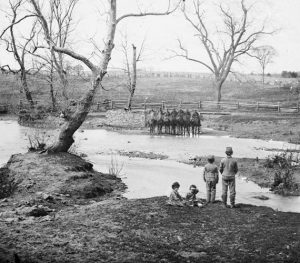
His brigade’s main aim was to be ready to support those needed in vulnerable areas along the Confederate lines. Jackson was prepared and made sure his troops would be ready for an immediate response whenever needed. Jackson was a religious person and his faith was strong, which influenced his fearlessness and his leadership qualities. Before the battle, Jackson’s time was spent in prayer, praying to the God above to help him and his troops in the battle that was to ensue. His unshakable faith and belief in God gave him confidence, strength, and clarity that strengthened him for the battle that was about to ensue. Jackson, along with his troops, got a sense of calm and composition as the tensions rose. Most of Jackson’s men believed that if they prayed, God would grant them unimaginable strength.
As day approached, the morning of July 21, 1861, a full-fledged war began between the Confederates and the Union forces. General McDowell’s army had the lead on the battlefield initially, flanking the Confederate forces at Matthews Hill with a surprise attack. Beauregard was forced to change his methods and move the battle towards Henry Hill, changing his approach, which in turn reinforced the Confederate lines with more men. The Confederates were taking heavy damage from the Union forces advancing towards them on Henry Hill. “There is Jackson standing like a Stonewall” were the words shouted by General Barnard Bee as he wanted to raise the morale of his troops when he saw Jackson’s valuable position. As these words were uttered by the General, they rallied his men, giving them a sense of courage. This was the exact moment when Jackson got the name Stonewall, and it cemented his legacy on the battlefield and in the history of America. The name Stonewall was given to him because of his heroism, valor, and bravery, which he showcased during the battle where his troops faced heavy resistance from the opposing force, in the face of all this, he stood there like a stonewall encouraging his men to do the same. 2
Due to his courageous act and his solid resolve, the rest of the troops in Jackson’s command also followed, and amid the immense pressure and continuous barrage of fire, they composed themselves from faulting. The calm composed and steadfast Confederate line now fought back the new-foiled Union assault, and all this was made possible due to the skill and knowledge possessed by Jackson of the battlefield and how he assessed the situation. His awareness was impeccable and his reactions to the assaults were commendable. The new line that was established by the Confederate forces along the edge of Henry Hill with artillery was the turning point moment, as now, due to their positioning, they gained an advantage strategically over the Union forces. Because of the placement of the artillery and its effective use, the Confederates were able to break up the flow of continuous Union attacks. Although Jackson’s brigade was under immense pressure and constant fire, they suffered casualties, and still, despite all this, they stood firm in the face of the adversary and held their lines. All of this was possible due to the genius of Jackson on the battlefield, as he was tactically and critically sound and aware.
On this day, Jackson’s courage and steadfastness prevailed on the battlefield as his troops, seeing his actions, stood behind him firmly. They had a sense of responsibility due to their leader being at the forefront of it all. They admired and loved him for his actions and respected him a lot more due to his nature of leading from the front. He often fought in the frontline alongside his troops, not worrying about his own safety. This in turn made him more feared and respected in the Confederate lines, inspiring his men to do the same. They, seeing their leader becoming an example of leading from the front, were inspired and got a new sense of courage and valor. This was made possible due to him being religious and having faith in religion and God. His deep faith and belief formed his leadership style and his thinking that because he was on the right path he would be protected by God. “My religious belief teaches me to feel safe in battle as in bed” were the famous words said by Jackson in battle during the onslaught of artillery fire. This inspired his troops and gave them more courage that their leader was clear in his thought process even under difficult conditions.3
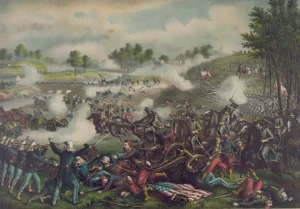
At last, the Confederates attained victory due to the genius decisions taken by Jackson, such as his use of artillery at crucial times, paired with his fearless nature, which led his forces and him to hold their ground until backup reinforcements arrived fortifying their lines further. As noon came, more Confederate forces joined the battle, further strengthening their brigade and shifting the momentum in their favor. All these factors combined ultimately broke the camel’s back, and the Union forces, sensing defeat, fled in retreat, leaving everything behind.
As July 22 dawned the next day, General McDowell’s forces retreated. This was the most vital and critical point in the early stages of the Civil War. As the Union army retreated from the battlefield, they left behind wounded soldiers, weapons, and war supplies in very large quantities. Their retreat was hasty and disorganized, which was the polar opposite of how the Confederate forces were. They rejoiced in their victory, which they attained due to their courage and strong resolve. Although the Confederates emerged victorious, the aftermath of the battlefield painted a very sorrowful picture with a lot of dead and wounded souls from both parties. As the army enjoyed their victory, Jackson on the contrary stood there not celebrating but rather thinking about the challenges to be faced ahead. Although he earned his title of “Stonewall,” Jackson still thought about what was to come ahead. Being the type of leader he was, Jackson engaged his brigade, preparing them for what was to come next.4
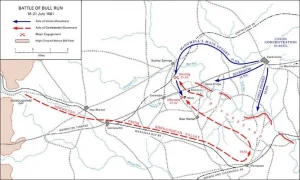
This battle showed who Jackson truly was, even though he and his men were victorious, Jackson still showed humility. That showed his character and his qualities of being a solid leader. The way he saw this victory was just the initial steps towards things to come. In the days following the battle, he sat with his troops, enforcing his doctrine of discipline, and mentally preparing them for their next endeavors. His tactics of discipline and his strong resolve later on defied his military career as a strong and unified one. As time progressed, due to Bull Run, Jackson became well-known throughout the Confederate ranks, making him admired by his peers. His tactics and resilience at Henry Hill earned and cemented his legacy as one of the finest, and a fearless leader. Jackson became the symbol of resilience in the South and his presence boosted the morale of his comrades. What made Jackson successful was his discipline and also his preparedness for battle, which made sure his brigade was battle-ready. Although they achieved victory, Jackson was yet aware of the challenges and difficulties ahead. He thoroughly worked to make sure his men would be ready for anything and everything that was to come. He made sure they would be battle-ready leaving little room for improvement in the months that followed.5
The first battle of Bull Run was a success. It was not only a Confederate victory but also a legacy-making moment for Stonewall Jackson. He emerged as a true leader when he stood on the front line in battle, his leadership style, battlefield strategies, and strong faith in his religion solidified his rank in the Confederate Army and a fearless and influential leader. The events of Henry Hill turned the tides of battle in the favor of the Confederate forces and his title of “Stonewall” began a legacy that the army would follow for years to come. As he emerged as a true leader at Bull Run, Jackson left a long-lasting impression and impact on the Civil War for future battles and years to come.
- Rachel A. Koestler-Grack, Stonewall Jackson (New York: Chelsea House, 2009), 82-83; Ted Ballard, Battle of First Bull Run (Washington, D.C.: U.S. Army Center of Military History, 2004), 3-4. ↵
- Rachel A. Koestler-Grack, Stonewall Jackson (New York: Chelsea House, 2009), 83; Ted Ballard, Battle of First Bull Run (Washington, D.C.: U.S. Army Center of Military History, 2004), 5-6. ↵
- Rachel A. Koestler-Grack, Stonewall Jackson (New York: Chelsea House, 2009), 84-85; Ted Ballard, Battle of First Bull Run (Washington, D.C.: U.S. Army Center of Military History, 2004), 10-13. ↵
- Rachel A. Koestler-Grack, Stonewall Jackson (New York: Chelsea House, 2009), 85-86; Ted Ballard, Battle of First Bull Run (Washington, D.C.: U.S. Army Center of Military History, 2004), 14-15. ↵
- Rachel A. Koestler-Grack, Stonewall Jackson (New York: Chelsea House, 2009), 86-88; Ted Ballard, Battle of First Bull Run (Washington, D.C.: U.S. Army Center of Military History, 2004), 15-16. ↵
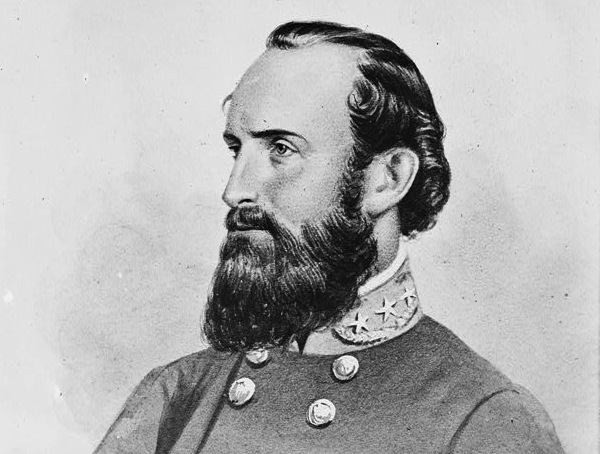

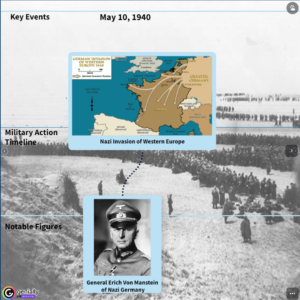
1 comment
Danielle Villanueva
I like how this article provides a fascinating look into Thomas “Stonewall” Jackson’s pivotal role in the First Battle of Bull Run. I was particularly impressed by how you detailed his leadership style, religious faith, and strategic brilliance. The vivid descriptions of his battlefield tactics and personal courage make this historical account engaging and informative. A potential improvement might be including more context about the broader implications of this battle for the Civil War.